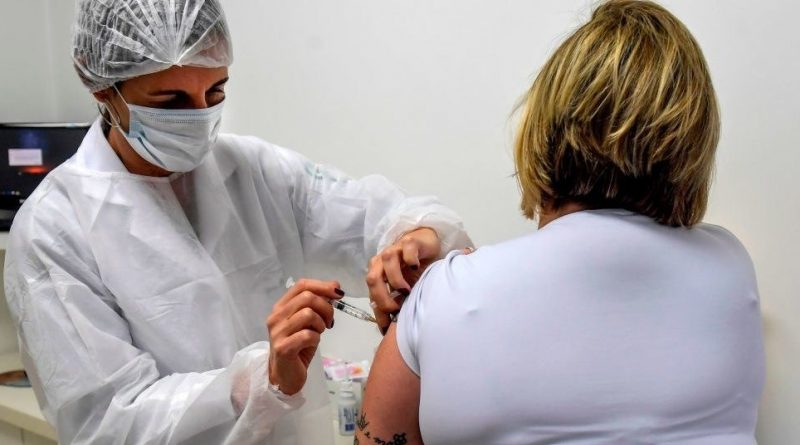AstraZeneca’s Coronavirus Vaccine Trial On Hold
[ad_1]
AstraZeneca and the University of Oxford’s major coronavirus vaccine trial, currently being tested at dozens of sites across the US, has been put on hold due to an “unexplained illness” in someone who received the vaccine.
The pause, first reported by Stat on Tuesday, occurred due to a suspected serious adverse reaction in a single person participating in the trial in the UK. It’s unknown what health problems the individual experienced.
A spokesperson for AstraZeneca said that the trial was paused as a precautionary measure so that scientists could investigate whether the illness is in fact linked to the vaccine.
“This is a routine action which has to happen whenever there is a potentially unexplained illness in one of the trials, while it is investigated, ensuring we maintain the integrity of the trials,” the spokesperson said.
“In large trials illnesses will happen by chance but must be independently reviewed,” the spokesperson added. “We are working to expedite the review of the single event to minimize any potential impact on the trial timeline. We are committed to the safety of our participants and the highest standards of conduct in our trials.”
Other scientists cautioned that the pause to investigate is exactly how clinical trials are supposed to work.
“It does happen. It’s not common, but it does happen,” Paul Offit, a vaccine expert at Children’s Hospital of Philadelphia, who sits on the FDA vaccine advisory committee, told BuzzFeed News. “The vaccine is to stop SARS-CoV-2. It’s not designed to stop everything else that happens in life. You want to make sure it was related to the vaccine, especially if it happened a short period of time after the vaccine begins.”
Last week the National Institutes of Health announced that AstraZeneca’s Phase 3 trial had started in the US, aiming to enroll 30,000 participants in 80 sites across the country to see whether the vaccine is safe and effective at preventing symptoms of COVID-19. AstraZeneca received $1.2 billion in US funding for 300 million doses, part of the Operation Warp Speed effort to fast-track coronavirus vaccines. Large trials are also underway in sites across the UK, South Africa, and Brazil.
The vaccine relies on a harmless chimpanzee virus containing the gene for the SARS-CoV-2 spike protein in order to trigger an immune response. It’s a new approach that has yet to lead to an approved vaccine, but has been tested in experimental vaccines against other viruses, including influenza and Ebola.
The Phase 1 and 2 trials of the vaccine, tested in 1,077 patients, showed promising “neutralizing” antibodies in around 90% of participants. Around 60% of patients reported mild or moderate side effects, including fever, headaches, and muscle aches, all of which were resolved in the course of the trials. No serious adverse events were reported during the early trials.
The pause comes as scientists and the public have expressed growing anxiety about the possibility that President Donald Trump could try to rush a coronavirus vaccine ahead of the US election.
On Tuesday, nine pharmaceutical executives, including the CEO of AstraZeneca, released a statement pledging that they would abide by “high ethical standards and sound scientific principles” and “only submit for approval or emergency use authorization after demonstrating safety and efficacy through a Phase 3 clinical study.” Offit called such a statement on behalf of pharmaceutical executives “unprecedented.”
“The Trump administration strong-arms science-based federal agencies,” Offit said. “People are worried that the FDA might not be looking out for their interests. So the pharmaceutical companies step up and say that we look out for your interests.”
Others criticized the fact that the American public has to rely on pharmaceutical companies for information about the vaccine, rather than getting clear information from the federal government.
“What concerns me is that Operation Warp Speed is treating this like any other product having industry in the lead,” Peter Hotez, a vaccine researcher at Baylor College of Medicine in Houston, told BuzzFeed News. “Their silence reflects a tone deafness to the fact that a COVID-19 vaccine is not the same as a new product for acne.”
